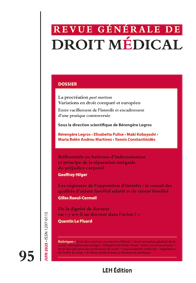Résumé
Depuis 1994, le législateur français pose comme un absolu l’interdiction de la procréation post mortem. Le droit de la bioéthique évoluant au gré des demandes sociétales, le législateur de 2021 a choisi d’élargir à la femme célibataire l’accès à l’assistance médicale à la procréation avec tiers donneur. Cette évolution légale justifie-t-elle, par effet domino, que la femme devenant conjointe ou compagne survivante à la suite du décès de son partenaire de vie puisse également concevoir avec les gamètes de ce dernier ou leurs embryons conservés in vitro ? La question se pose d’autant plus que le droit prétorien, interne et européen, tend à faire vaciller l’interdit légal. Parallèlement, le droit à devenir « grand-parent » avec le matériel procréatif d’un enfant décédé émerge, demande inédite rejetée tant par la jurisprudence française que par celle de la Cour européenne des droits de l’Homme. Cette revendication des ascendants questionne sur d’autres demandes sous-jacentes qui, sous le prisme de l’égalité, font émerger le spectre de la remise en cause de l’interdiction de la maternité de substitution.
Mots-clés
Procréation post mortem – Interdit – Conjoint survivant – Conseil d’État – Cour européenne des droits
de l’Homme – Grands-parents – Post mortem sperm retrieval
Abstract
Since 1994, French law has prohibited post-mortem procreation. As bioethics law evolves in line with societal demands, the legislator of 2021 chose to extend access to medically assisted procreation with a third-party donor to single women. Does this legal evolution justify, by domino effect, that the woman who becomes the surviving spouse or partner following the death of her life partner can also conceive with the latter's gametes or their embryos stored in vitro? The question arises all the more so as domestic and European legal precedents are tending to undermine the legal prohibition. At the same time, the right to become a grandparent with the procreative material of a deceased child is emerging, an unprecedented demand rejected by both French case law and that of the European Court of Human Rights. This claim by ascendants raises questions about other underlying demands which, under the prism of equality, raise the spectre of calling into question the ban on surrogacy.
Keywords
Post mortem procreation – Prohibited – Surviving partner – Council of State – European Court of Human Rights – Grandparents – Post mortem sperm retrieval



